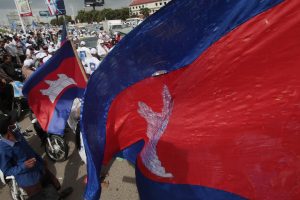In 1991, the international community came together to sign the landmark Paris Peace Agreements for Cambodia, with two primary objectives: ending decades of civil war that had left millions dead and instilling liberal democracy. Looking back, one of those objectives has been realized, with the country enjoying around 20 years of relative peace, while democracy has never looked more out of reach.
In hindsight, the two goals were always at odds in a country where the major political factions were heavily armed and some were explicitly opposed to democracy. Bringing true democracy probably would have required more conflict, not less, while maintaining the uneasy ceasefire required the international community to look away as the fledgling democracy’s wings were clipped.
The accords also became a defining part of Cambodia’s domestic politics, with pro-democracy opposition figures and civil society groups arguing that they were a continued obligation by the Cambodian government and international community to ensure democracy and human rights. Prime Minister Hun Sen and the Cambodian People’s Party, which has ruled the country for over 40 years, instead saw the agreements as a one-off set of obligations for the 1993 election, which have since been completed and are no longer relevant. Despite attempts by the opposition to drag signatories back in, the international community largely took the latter view.
In 2016, Japan’s former ambassador to Cambodia gave a speech in Phnom Pen marking the 25th anniversary of the accords. Yukio Imagawa, who had represented Japan at the negotiations, called the signing the “pinnacle of my diplomatic life for 40 years.”
“The purpose of the Paris Agreements was to terminate the civil war and create conditions where Cambodian people could determine their own political future through free and fair elections,” he said, noting that Cambodia had gone on to hold four more elections since then, although he significantly did not comment on their quality. He expressed hope that Cambodia’s next elections would be free and fair.
They were not.
In 2017, the country’s only viable opposition party, the Cambodia National Rescue Party (CNRP), was dissolved by the Supreme Court. Its two founders, Sam Rainsy and Kem Sokha, were exiled and arrested for treason, respectively. The 2017 crackdown was described by many as the death of democracy, but it would be more accurate to say it was simply the moment Cambodia shed its veneer of democracy, which never really existed, despite the international community’s half-hearted attempt to instill it.

































